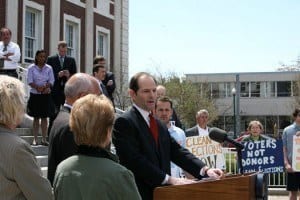
Shells of Spitzer and Weiner eye comeback
Eliot Spitzer is working on political deliverance in the same state where he met disgrace in 2008. After resigning from the governorship five years ago amid revelations that he spent thousands of dollars on prostitutes, Spitzer has launched petition campaign Monday to become New York City comptroller.
“I made significant errors. I stood up, accepted responsibility, resigned. It’s now been five years, I hope the public will extend its forgiveness to me,” the Democrat said Monday morning on radio’s “The Bill Press Show.”
While it seems like it could be a long shot, former South Carolina Governor Mark Sanford, currently congressman, proves with his story that Spitzer’s return is possible. After being censured by the state general assembly for ethics issues stemming from allegations that he misused state travel funds to conduct an extramarital affair with an Argentinean woman, he returned to the U.S. House of Representatives in May of this year.
Spitzer must gather 3,750 signatures by Thursday to get onto the September primary ballot, and in a hilarious coincidence, that would be the same ballot as Anthony Weiner. If the former congressman is elected, after resigning in 2011 amid a scandal involving lewd photos sent via Twitter, he would have the quickest rebound out of the three.
Weiner apologized in a similar fashion, “I made some big mistakes, and I know I let a lot of people down. But I’ve also learned some tough lessons. I’m running for mayor because I’ve been fighting for the middle class and those struggling my entire life. And I hope I get a second chance to work for you.”
Returns to the public stage like this bring up an interesting question: how are disgraced politicians able to come back so quickly?
There are a few answers to this; for example, one Republican political strategist thinks it reflects a lower opinion of politicians. John Brabender, a longtime top political advisor to 2012 Republican presidential candidate and former Sen. Rick Santorum, says, “The required waiting time has been greatly condensed in recent years, indicating present voters are holding elected officials to a much lower standard then previous generations.”
Spitzer says this on the condition that’s saving him: “I think it is a land of forgiveness, of people in their natural goodness (who) understand the fact that…we sin, we pay a price and hopefully continue.”
Additionally, the media just loves a comeback story, because they provide material to cover in the past and present. While covering present news, it allows outlets to go back and revisit what brought down a politician in the first place. And redemption can resonate well with the public.
“Voters love a good comeback story—we identify with the underdog and cheer for him as we would for ourselves,” said Republican strategist and CNN contributor Alex Castellanos. “But voters also love justice. We want people to pay for their mistakes.”
Democratic strategist and CNN contributor Paul Begala says supercharged news cycles and fleeting, momentary memories may be behind 2013’s triad of comeback attempts, “but it may also be a result of a very healthy American aversion to being too judgmental.”
“It used to be an iron law of politics that no divorced person could be president. Then Ronald Reagan proved that wrong,” added Begala, who was a top political adviser to President Bill Clinton and a senior adviser for the super PAC that worked for President Barack Obama’s 2012 re-election.
“Ultimately politics is about voters’ lives, not politicians—if voters think someone can make a difference in their life, they will overlook personal shortcomings,” he said. “But the key is not to make the campaign about the politician’s need for redemption, but about voters’ need for jobs.”














